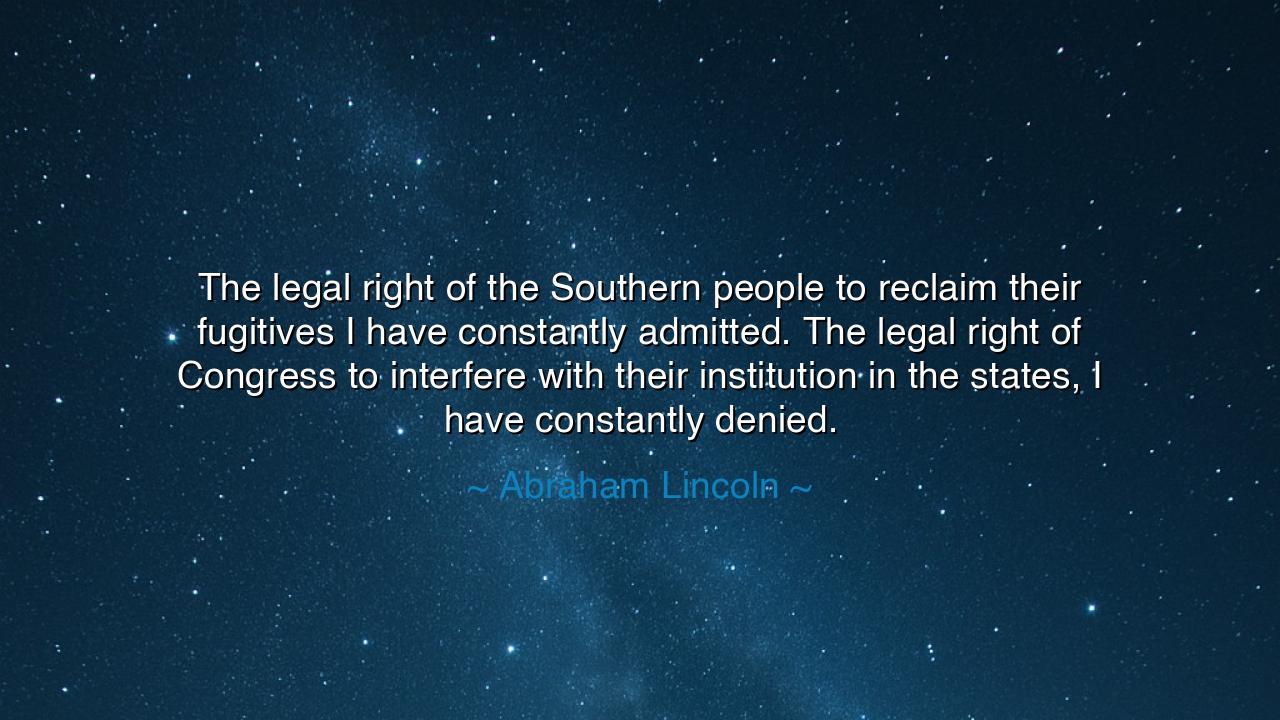
The legal right of the Southern people to reclaim their fugitives
The legal right of the Southern people to reclaim their fugitives I have constantly admitted. The legal right of Congress to interfere with their institution in the states, I have constantly denied.






Hear the solemn words of Abraham Lincoln, who carried the weight of a divided nation upon his shoulders, and who declared: “The legal right of the Southern people to reclaim their fugitives I have constantly admitted. The legal right of Congress to interfere with their institution in the states, I have constantly denied.” In these words, spoken before the storm of civil war, we hear the careful balance of a man torn between law and conscience, between the written statutes of his age and the higher truth stirring within his heart.
The origin of this saying lies in the debates of the mid-19th century, when the United States stood on the edge of fracture. The Fugitive Slave Laws gave the South the legal power to pursue escaped slaves even into free states, and many in the North despised these laws, calling them an offense to humanity. Yet Lincoln, ever cautious as both lawyer and statesman, acknowledged that under the Constitution as it then stood, the South did indeed have this legal right. At the same time, he denied that Congress had the authority to abolish slavery where it already existed, for no such power was granted by the founding charter. Thus he sought to walk a narrow path: honoring the Constitution as it was, while keeping alive the hope of what it might become.
This statement must be heard with the gravity of its time. For Lincoln did not speak these words because he loved slavery, but because he revered law, order, and the fragile union that still bound North and South together. He understood that to deny the legal rights of the South outright would be to shatter the Union before the North had the strength to resist. And yet, within his heart, he yearned for a nation where the very institution of slavery would vanish, not by reckless defiance of the Constitution, but by steady moral and political struggle that would one day reshape it.
History gives us many examples of such tension. Consider the story of William Wilberforce in Britain, who for decades labored within the law to abolish the slave trade. He did not begin with sweeping decrees, but with careful steps, building momentum until the nation itself could no longer deny justice. Lincoln stood in a similar place, recognizing what law permitted in his day, even as he prepared the ground for the greater emancipation that would follow. His words remind us that wisdom is not always the cry of immediacy, but sometimes the patience of preparation.
The meaning of Lincoln’s teaching is that there is often a difference between what the law declares and what justice demands. To admit the legal right of a thing is not to sanctify it; it is to acknowledge the chains of the present order. But to deny the expansion of that injustice is to sow the seeds of change. Lincoln refused to let slavery spread into new states. He accepted its existence under current law, but he denied its growth. In that denial lay the first hammer strike against the edifice of bondage.
The lesson for us is clear: when faced with injustice, do not confuse legality with morality. Many evils have been clothed in the garments of law. Yet even when the law cannot be overturned at once, the righteous can resist its expansion, prepare the minds of the people, and work tirelessly for the day when the law itself is remade. Lincoln’s path was not the path of firebrand rhetoric, but of steady resolve, guiding a nation step by step toward emancipation.
And what shall we do in our own age? We must learn to discern between legal right and moral right. When laws protect injustice, let us not be complacent, but neither let us despair. Instead, like Lincoln, let us use the law’s own language to restrain evil, while striving for a future where justice and law walk hand in hand. Support leaders who respect both order and conscience. Teach children that obedience to law is noble, but obedience to justice is higher still.
So remember the wisdom of Abraham Lincoln: he admitted what law demanded, but he denied what law had no authority to claim. In this balance, he prepared the ground for freedom. Let us too be wise, neither blind to law nor deaf to conscience, but ever striving toward the day when both speak with one voice—the voice of justice.






AAdministratorAdministrator
Welcome, honored guests. Please leave a comment, we will respond soon